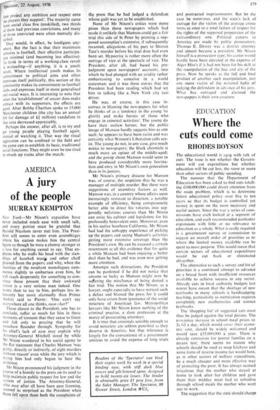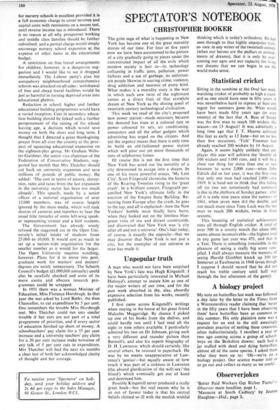EDUCATION
Where the
cuts could come
RHODES BOYSON
The educational world is agog with talk of cuts. The issue is not whether the Govern- ment will cut expenditure but whether education will be cut less, the same or more than other sectors of public spending.
The rumour that the Department of Education has been asked to find cuts totall- ing £100,000,000 could divert attention from the main problem, which is to determine future educational policy over five to ten years so that its budget is controlled yet money is spent on the most necessary and useful sectors. Since the war a series of com- missions have each looked at a segment of education, and each recommended particular expansions with little or no relevance to education as a whole. What is really required is a government survey or commission to suggest an overall order of priorities as to where the limited money available can be spent to most purpose. This would mean that certain sectors of educational expenditure would be cut back or eliminated altogether.
The alternative to such a survey and list of priorities is a continued attempt to advance on a broad front with insufficient resources available to achieve success in any sector. Already cuts in local authority budgets last winter have meant that the shortage of new textbooks in many schools is handicapping teaching, particularly as metrication requires completely new mathematics and science textbooks.
The 'shopping list' of suggested cuts must thus be judged against the total picture. The ninepence increase in school meal prices to 2s Gd a day, which would cover their econo- mic cost, should be widely welcomed and would save £35,000,000 a year. There is already remissions for poorer families on a means test; there seems no reason why schools should be used as soup kitchens and some form of reverse income tax would here, as in other sectors of welfare expenditure, be a much cheaper and more effective way of protecting the poor. It has always seemed iniquitous that the mother who stayed at home to look after her children and gave them their midday meal had to subsidise through school meals the mother who went out to work.
The suggestion that the state should charge
for nursery schools is excellent provided it is a full economic charge to cover revenue and capital costs with remissions on a means test,
until reverse income tax is introduced. There is no reason at all why prosperous working and middle class families should be further subsidised; and a partial charge would simply encourage nursery school expansion at the expense of other items in the educational budget.
A restriction on free travel arrangements for children, however, is a dangerous sug- gestion and I would like to see it dropped immediately. The Labour party's plan for compulsory neighbourhood comprehensive schools was attacked on all sides: withdrawal of free and cheap travel facilities would be just as harmful in turning deprived areas into educational ghettos.
Reduction in school, higher and further educational building programmes would have a varied reception. Cuts in secondary educa- tion building should be linked with a further postponement of the raising of the school leaving age, a decision which would save
money on both the short and long term. I thought that I detected a great thanksgiving
prayer from all over the country at the pros- pect of squeezing educational expansion on the eighteen-plus group. Mr Graham Webs- ter-Gardiner, the senior vice-chairman of the
Federation of Conservative Students, sug- gested last month that Mrs Thatcher should
cut back on university expansion and save millions of pounds of public money. He added: 'The cost in terms of misery, disrup- tion, rates and taxes from the last expansion in the university sector has been too much already'. This speech, made by a senior officer of a national organisation of over 12,000 members, was of course largely ignored by the mass media, which will rush dozens of cameras and reporters to hear the usual trite remarks of some left-wing speak- er representing sixteen and a half students. The Government has already wisely refused the suggested cut in the Open Uni-
versity's initial intake of students from 25,000 to 10,000. It would cost as much to set up a nation-wide organisation for the smaller number as it would for the larger. The Open University requires watching, however. Plans for it to move into post-
graduate work for masters' and doctors' degrees are surely unnecessary. The Schools Council's budget (£1,000,000 annually) could also be carefully checked and some of its more exotic and obscure research pro., grammes could be scrapped.
In 1951 there was a woman Minister of Education, Miss Florence Horsbrugh. In that year she was asked by Lord Butler, the then Chancellor, to cut expenditure by 5 per cent. One remembers the trouble Miss Horsbrugh
met. Mrs Thatcher could run into similar trouble if her cuts are not part of a total programme of priorities, and if every sector of education finished up short of money. A schoolteachers' pay claim for a 37 per cent
increase and a university teachers' pay claim for a 20 per cent increase make nonsense of any talk of 5 per cent cuts in expenditure. Mrs Thatcher will find the next six months a clear test of both her acknowledged clarity of thought and her courage.































 Previous page
Previous page